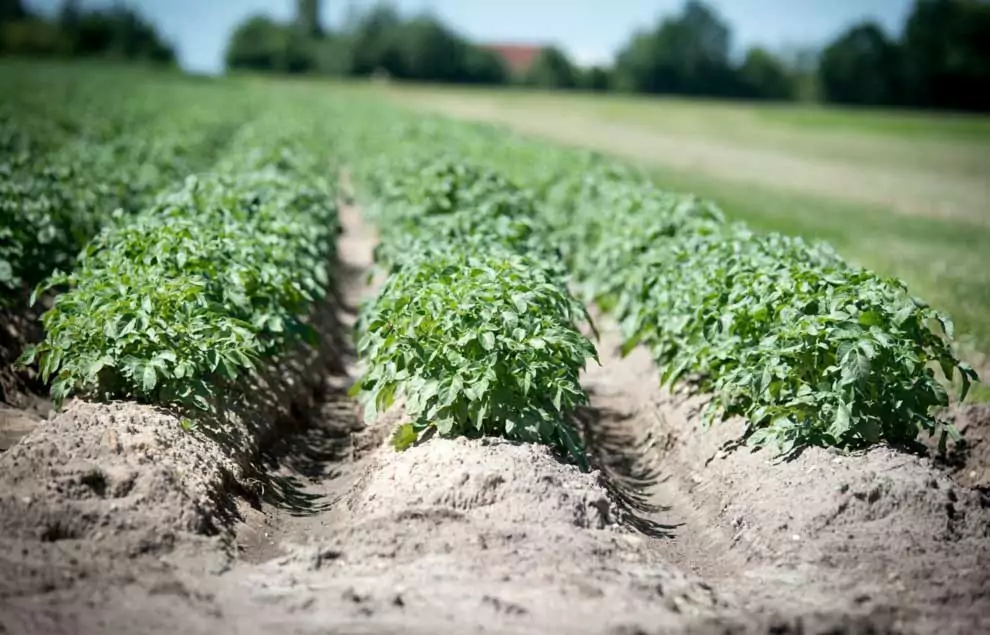
The use of Epsom salt for potatoes is a popular and time-tested foliar fertilizer among farmers for its incredible qualities.
Is Epsom Salt Good for Potatoes?
Yes, Epsom salt’s hydrated magnesium sulfate composition enables potato plants to efficiently absorb essential nutrients, enhancing growth. Adding 1 cup of Epsom salt is beneficial for the overall health of regular potatoes and sweet potatoes.
Its high amount of magnesium aids in promoting metabolic activities in plants.
Additionally, it supports the development of potatoes’ cell walls. It is also used as a natural treatment for tainted leaves as it increases chlorophyll production in grains. Thus it boosts the green color of leaves and assists in healthy growth.
Farmer’s experiences over years reveal that the use of Epsom salt brings so many benefits including increased growth of potato plants and potatoes as well.
Further Reading: Fertilizer Planning for Potatoes
Substitutes for Epsom Salt
Substitution for Epsom salt can be different, from season to season as well as soil conditions. We recommend you consult with a local gardening supply store for more specific helping information on your garden needs.
Generally, Calcium sulfate is considered a good alternative for Epsom salt. Another pearl is baking soda for you to try. It lessens the acidity in plants and prevents fungal growth.
Also Read: You Must Need These Fertilizers for Potatoes
How Often to Spray Potato Plants with Epsom Salt
Though Epsom salt is effective in plant development, most plants do not need it in a large quantity. A little amount is enough.
Use Epsom salt in the process below and enjoy the result.
- Make a water solution with two tablespoons of Epsom salt in a gallon of water.
- Use a sprayer bottle. Shake well until the salt is completely dissolved in the water.
- Spray this solution on the leaves, stems, and soil.
This procedure is enough to repeat only once a month. But if you prefer to spray it every two weeks then cut the salt to one tablespoon.
Other Vegetable Plants That Benefit from Epsom Salt
Epsom salt, a natural fertilizer that contains minerals enriched with magnesium, sulfur, and oxygen helps plants grow bushier. It aids in seed germination, deters pests, and produces more flowers.
Numerous plants benefit highly from this fertilizer supplement. Blueberry, spinach, cauliflower, cabbage, broccoli, squash, corn, cucumber, eggplant, lettuce, onion, and watermelon enjoy extra magnesium very well.
Peppers, tomatoes, and eggplants need plenty of magnesium. So, the application of a foliar spray with Epsom salt will help plants to produce bountiful and delicious fruits. It is also helpful to prevent blossom end rot in tomatoes.
Not only the veggies but also the flowers can be benefitted from it. Particularly it aids roses to bloom fully and creates greener leaves.
Epsom Salt for potatoes and other plants, watch the video:
FAQs
Can Epsom Salt Harm Potato Plants?
Epsom salt is a well-known mineral used in planting potatoes and the above words give a clear view of the benefits of Epsom salt in them.
But according to the popular quote, “Everything in excess is opposed to nature”. It is true for potato plants and Epsom salt, too. Adding Epsom salt will only help if your soil truly is magnesium deficient.
Otherwise, a large amount of magnesium may reduce the uptake of other vital nutrients. Remarkably calcium uptake will be hindered. Moreover, the minerals contained will contaminate the percolating water into the land.
Do Potato Plants Need Epsom Salt?
Before you make delicious dishes with potatoes and quench your hunger, it’s necessary to feed the potatoes. Fertilizing well is important to get a better plant. On average, they are fertilized four to five times during their life cycle.
Farmers use various fertilizers while planting potatoes. However, choosing the right variant is important. Epsom salt serves quite well in this regard. It is beneficial in several ways.
First of all, it improves seed germination and cures short height and smaller size problems in potatoes. Some nutrients that Potato plants need are nitrogen, phosphorus, potassium, magnesium, manganese, and boron.
Epsom Salt will help to recover the magnesium deficiency in your soil. And as you know magnesium is a very important nutrient that potato plants need. Also, potatoes need this sort of fertilizer to build up their cell walls.
Epsom salt, a mineral salt, is highly advantageous for potatoes. It does not create acidic soil. Last but not the least, calcium deficiencies in the soil is also treated with Epsom salt.
Final Thoughts
Potatoes are easy to grow if you give good care. Right fertilizer, good watering, and planting in time are important.
There is a famous saying, feed the soil, not the plants. Prepare your soil carefully. A soil test before plantation may help you know the deficiencies in your soil and take action accordingly.
Hopefully, the above words have informed you better about Epsom salt and given you an answer: is Epsom salt good for potato plants?
As it’s a natural supplement for fertilizers so there is less risk for beginners to use it in the soil. Give a little care into this matter that anything in excess is a poison. So, putting Epsom salt in the right amount is important.
Using Epsom salt correctly will boost your plant growth. Plus, it will help you by giving you a sound garden free from harmful insects. So, finally, enjoy bushier and sweeter potatoes.
